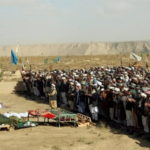US Special Representative for Afghanistan Reconciliation, Zalmay Khalilzad, on Tuesday said he returned to the region “disappointed” that despite commitments to lower violence, it has not happened, referring to a recent surge in Taliban attacks as well as civilian and Afghan forces casualties in the country.
The Defense Ministry on Tuesday said the Taliban staged attacks and other “violent activities” in at least 22 provinces over the past 24 hours.
“Too many Afghans are dying, Khalilzad said, reiterating that “the sides urgently need an agreement on a reduction of violence leading to a permanent and comprehensive ceasefire.”
Khalilzad reiterated that “the window to achieve a political settlement will not stay open forever,” adding that “intransigence and a refusal to abandon animosity, embrace fellow citizens, and agree on a formula for political cooperation/competition underpin the ongoing war.”
Khalilzad said: “Afghans are dying at a high rate, and regional spoilers are using Afghans as cannon fodder for their illegitimate objectives.”
He said that “Afghans need to pivot to development instead of destruction, stability instead of chaos, forgiveness instead of vengeance, compromise instead of inflexibility.”
The US Special Representative for Afghanistan Reconciliation Zalmay Khalilzad departed for Oslo on October 26, said the US Department of State in a statement on Tuesday, adding that in Norway, he discussed international coordination and support of the Afghan peace process.
In Doha, Khalilzad will meet with the negotiating teams to follow up on ongoing discussions to reduce violence and press both sides to immediately stem the recent increase in violence that Afghans across the country are being forced to bear.
Along with international partners, Khalilzad will press the two negotiating teams to accelerate their efforts and agree to a political roadmap that ends Afghanistan’s 40-year-long war.
“The sides must move past procedure and into substantive negotiations. American and international assistance remains available to all sides,” it added.
Civilian Casualties
The UN mission to Afghanistan (UNAMA) report released on Tuesday said that overall, the civilian casualty figure for the first nine months of 2020 dropped by around 30 percent compared to the same period in 2019, but while the number of civilian casualties is lowest in the first nine months of any year since 2012, “the harm done to civilians remains inordinate and shocking.”
“High levels of violence continue with a devastating impact on civilians, with Afghanistan remaining among the deadliest places in the world to be a civilian,” the report said.
“The peace talks will need some time to help deliver peace. But all parties can immediately prioritize discussions and take urgent, and frankly overdue, additional steps to stem the terrible harm to civilians,” said Deborah Lyons, the Secretary-General’s Special Representative for Afghanistan in the report.
UNAMA documented that Anti-Government Elements (AGEs) remain responsible for the majority of civilian casualties (58 percent). Compared to the same period in 2019, the number of civilian deaths attributed to AGEs remained at similar levels, although there was a decrease
of 34 percent in the total number of civilian casualties – killed and injured – attributed to AGEs, said the report.
The report said that the number of civilians killed attributed to the Taliban increased by six percent in the first nine months of 2020, adding that the overall number of civilian casualties – killed and injured – attributed to the Taliban dropped by 32 percent, mainly due to a reduction in the number of civilians injured by suicide attacks and ground engagements, though this was partially offset by an increased number of civilian casualties from targeted killings and illegal, indiscriminate pressure-plate improvised explosives devices (IEDs).
Doha Talks
Sources in Doha recently told TOLOnews that the Taliban is still insisting on the US-Taliban agreement to be the foundation for the talks.
The contact groups are meeting to establish procedural rules and an agenda for the talks.
The two sides have agreed on 18 out of 20 articles for the procedural rules, but two main articles—the religious basis for the talks and connection of the US-Taliban deal with the negotiations—remain unsolved.
The Taliban insists that if a dispute emerges during the negotiations, the solution must be sought using the Hanafi jurisprudence and that the foundation for the talks should be the peace deal that the group signed with the US in late February.
But the Afghan republic’s team has rejected the Taliban’s demands and has suggested some alternatives.
The peace negotiations between teams from the Islamic Republic of Afghanistan and the Taliban started on September 12; however, so far, direct talks have not started because of disagreements on procedural rules for the negotiations.
More suggestions have been put on the table to overcome the rift between the two teams, which include the religious basis for the talks and the connection of the US-Taliban deal with the negotiations.













